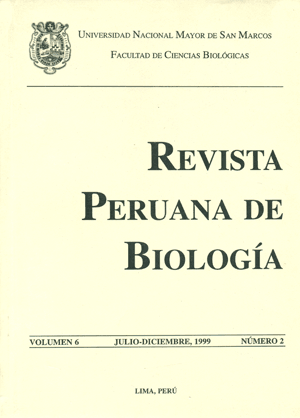Infection for Enterobius vermicularis in kindergarten children of rural communities
DOI:
https://doi.org/10.15381/rpb.v6i2.8311Keywords:
Enterobius vermicularis, kindergarten children, method of Kanawati-Mc Laren, method of Graham.Abstract
A group of 123 children aged 3 to 6 was chosen to study the effects that Enterobius vermicularis infection has on the school children's educational output. These children were the whole pre-scholar population of the kindergarten rural community in Carabayllo and Santa Rosa de Quives in Lima, Perú. This study included a parasitologic and nutritional examination of the children, using the modified Graham's techniques and the nutritional method of Kanawati-Mc Laren. The result was 34,14 per cent of children with Enterobius vermicularis, and 18,08 per cent with a light protein-caloric malnutrition. The relation between the results from the varianza analysis enables us to conclude that Enterobius vermicularis infection does not have an effect on the children's performance in the school; however we can not generalize on this result because no other intestinal parasites were examined and the initial development is more motional than intelectual. Malnutrition was present in children of 5 years old and not in those of 3 and 4 years old who go to school according to our pre-scholar system and the method was not adequate.Downloads
Downloads
Published
Issue
Section
License
Copyright (c) 1999 Rodolfo Talledo, Julia Castro

This work is licensed under a Creative Commons Attribution-NonCommercial-ShareAlike 4.0 International License.
AUTHORS RETAIN THEIR RIGHTS:
a. Authors retain their trade mark rights and patent, and also on any process or procedure described in the article.
b. Authors retain their right to share, copy, distribute, perform and publicly communicate their article (eg, to place their article in an institutional repository or publish it in a book), with an acknowledgment of its initial publication in the Revista Peruana de Biologia.
c. Authors retain theirs right to make a subsequent publication of their work, to use the article or any part thereof (eg a compilation of his papers, lecture notes, thesis, or a book), always indicating its initial publication in the Revista Peruana de Biologia (the originator of the work, journal, volume, number and date).






